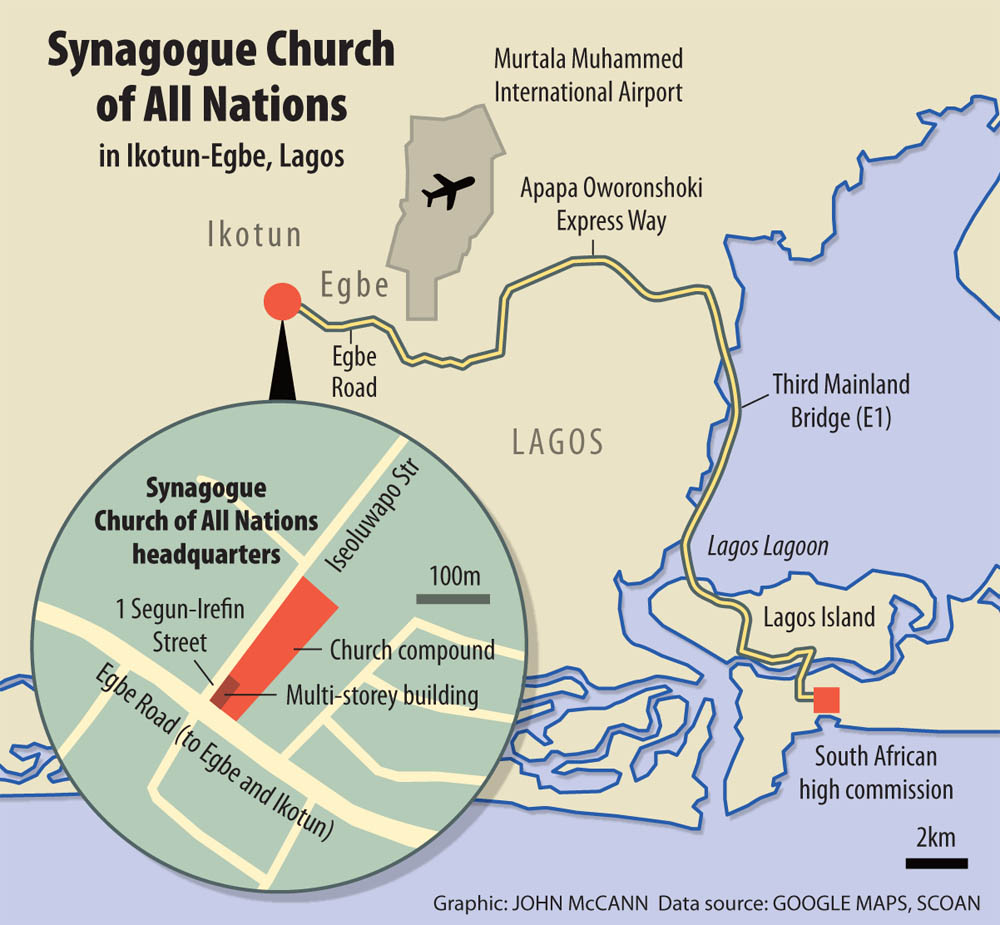Rescue workers clear the debris of a collapsed guesthouse at the Synagogue Church of All Nations in Lagos. Not a single body bag has arrived in South Africa yet.
Diplomatic tensions between South Africa and Nigeria have escalated as the government struggles to get answers about the collapse of a church building in Nigeria last Friday that killed the largest number of South Africans outside the country since the downing of the Helderberg airliner in 1987.
Pretoria’s diplomats are contending that “Nigeria is obsessed with its competitive attitude towards South Africa”.
“The Nigerians have flatly refused our search and rescue missions, the same way they initially refused international assistance during the search for the missing girls,” said a senior South African government official involved in the mission to bring the bodies of citizens home.
“They feel that this could send a politically worrying message that they don’t have capacity. The reality is that our search and rescue teams and sniffer dogs are the best on the continent,” said the official.
South Africa’s rescue teams have remained on standby.
‘Secrecy and superstition’
“Making matters worse is Nigeria’s culture of secrecy and superstition. You find even government officials believing in the cult of this prophet and not asking questions during such disasters. It’s unbelievable. But there is also an element of cover-up by [preacher TB] Joshua, because there is a possibility of litigation cases against him for negligence,” said the government official.
The South African government was forced to find out about the collapse through its own diplomats. This led to President Jacob Zuma announcing the fatalities more than four days after the incident, a delay that has provoked questions over the relationship between the two countries.
The Nigerian government, it seems, did not inform South Africa immediately and, as the tragedy has unfolded, it has issued fatality numbers that differ markedly from South Africa’s own figures.

The Mail & Guardian understands through diplomatic sources that 18 South Africans are unaccounted for. Nigerian authorities are disputing the 67 deaths that Zuma announced and the West African nation has continued to refuse Pretoria’s offer to send a search and rescue team.
The missing people could be dead, lying in hospitals or still under the rubble.
Bodies identified
Department of international relations and co-operation spokesperson Clayson Monyela confirmed that South Africa has identified most of the bodies through passports, and that the government will work with family members to identify the remains of their loved ones.
Without sniffer dogs and the country’s search and rescue experts, the chances of finding survivors buried under the rubble “diminish by the hour”, the government official said.
He said, without maximum co-operation, South Africa fears that the death toll of its nationals could rise.
“Some of the bodies have been crushed beyond recognition. It’s going to take DNA and other tests, verification through clothing or other items by family members,” said the official, adding that not a single body bag had arrived in South Africa by the time of going to press. “It’s going to take time.”
Zuma said on Tuesday that at least 67 South Africans had been killed when the building in the compound belonging to the Synagogue Church of All Nations in Lagos collapsed.
But Nigerian emergency services on the same day put the total death toll for the accident at 62. There was no immediate explanation for the discrepancy.
Offensive reaction
The disgusted senior official said the reaction from Nigeria was offensive. “The worst thing to note [is that] the Nigerian government has not issued any statement: no condolences to our government, nor to the families.”
Dr Oladiran Bello of the South African Institute of International Affairs told the M&G that the relationship between the two countries has ebbed and flowed in the past 20 years, with “irritants” on both sides.
“The current spat between authorities on both sides stems from the fact that South Africa announced hard figures while the Nigerian counterparts are saying we’ve spoken too soon, before facts have been established.”
But International Affairs Minister Maite Nkoana-Mashabane refused to point fingers or raise doubts about the strength of the diplomatic ties between the two countries when she spoke to journalists on Wednesday afternoon, saying the countries had to focus on the crisis at hand.
She did note, however, that South Africa had obtained its information primarily through its own sources.
“We do have a consul general office in Lagos, so that is where we were getting information from the time the building collapsed and we had to work with Nigerian authorities,” she said.
Diplomatic relations
She would not respond to questions about when exactly Nigeria had first contacted South Africa about the incident.
But Bello said the diplomatic relationship between the two countries will recover.
“It’s a relatively minor thing in the broader scheme of things between the two countries,” he said.
“There is a tendency for irritants to build up in this relationship, but the fundamentals and economic complements are such that they have to work together.” – Additional reporting by Andisiwe Makinana and Moshoeshoe Monare